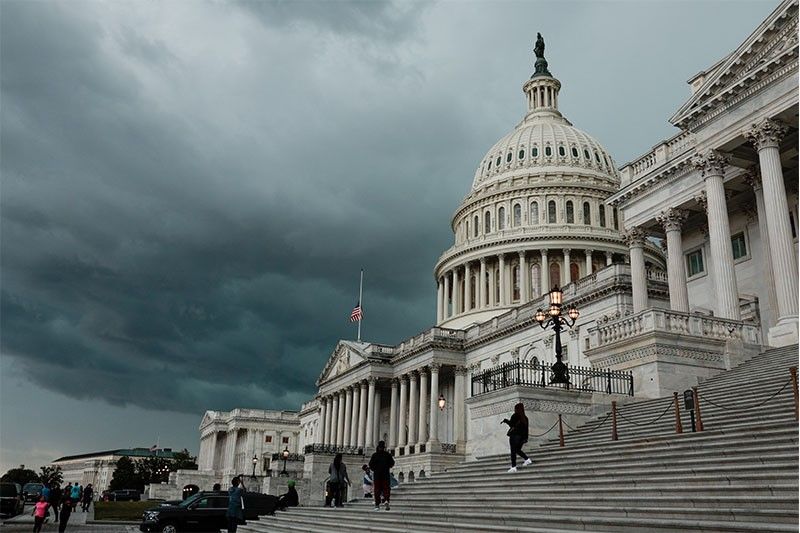Do the US midterms matter? How results may influence foreign policy in Asia

PHOENIX, Arizona — What does a vote in Arizona have to do with life in Manila more than 12,000 kilometers away? Potentially a lot, since results of the ongoing midterm elections could have far-reaching effects in a region where the US and China are competing for influence.
Republicans taking control of the US House of Representatives in the 2022 midterm elections could mean less engagement on international issues, analysts said, saying also that rivalry with China would likely still remain a hot-button topic for both the Republican and Democrat parties.
All 435 seats in the US House of Representatives and 34 of 100 Senate seats are being contested in the ongoing polls.
A win by the dominant Democratic party would see a likely continuation of US President Joe Biden's foreign policy but a Republican win in either house of US Congress could lead to a more isolationist stance, which would limit Washington's involvement outside US borders.
Joshua Kurlantzick, senior fellow for Southeast Asia at Washington-based think tank Council on Foreign Relations, said there is already a growing number of Republican political figures who are growing "more wary of US involvement in many parts of the globe."
What happens if Republicans win either house of Congress?
"If the GOP wins the House, even a House speaker who was generally internationalist would have to cater to what would probably be an influx of isolationist members who broadly support the policies espoused by former President Donald Trump, who remains one of the most powerful figures in the party and is suspicious of US relationships with many Asian partners, whom he believes do not contribute enough to their own defense," Kurlantzick wrote in a column at The Japan Times.
Kurlantzick said a Republican House speaker may rethink Washington’s current involvement in Asia, including reconsidering its relationship with South Korea and other US treaty allies like the Philippines in Asia.
A Republican win could also affect US defense spending and military agreements — including those with the Philippines, which has a Mutual Defense Treaty, a Visiting Forces Agreement and an Enhanced Defense Cooperation Agreement with its treaty ally and former colonizer.
The US earlier this year pledged $100 million in financing to the Armed Forces of the Philippines, which has historically relied on US-sourced equipment.
The Philippine military has been working to upgrade its capabilities in external defense in the face of a simmering dispute with China in the West Philippine Sea as well as in internal security as it ramps up operations against the New People's Army.
READ: With fences mended, Philippines and US plan dialogue on security alliance
But Greg Winger, professor at the University of Cincinnati’s School of International and Public affairs, said that foreign policy may not be lawmakers' top priority. He also points out that foreign policy decisions are "so tightly controlled" in the executive branch to be overly affected by changes in the legislature.
Political over policy goals
Political parties could also put foreign policy on the back burner immediately after elections as they focus on their own political agendas, he said.
"It's not the specific policies per se, it’s the overall issue of governance [that I’m worried about] and that's I think especially if the Republican Party takes control of one of the house of Congress, which looks likely," Winger told Philstar.com in an online interview.
"There's still a lot of anger over the 2020 election, about the impeachments, and to what extent will either of both parties be pursuing political goals instead of policy goals."
A recent poll conducted by CNN showed that a strong base coupled with concerns over the economy give the Republicans an advantage in winning a majority at the US House.
This would mean a comeback for former president Trump’s political party. He was impeached twice by the House but managed to finish his term in office as trial began in January last year.
His second impeachment was brought about by his alleged involvement in the January 6, 2021 Capitol attack. A congressional panel this year put the former chief executive and his claims of being cheated out of a second term at the center of an attack on the US Capitol to overturn the result of the 2020 elections.
Winger suspects a Republican-controlled House could move to impeach Biden in retaliation.
RELATED: A year after Capitol riot, Americans fear for their democracy — polls
Worry over China remains
Winger said however that the rivalry with China could become "a weird point of convenience" for both parties, who would want to assert US strategic dominance in Asia and in the world.
Kurlantzick pointed out Republicans lawmakers may push for a review of US involvement with allies in Asia and put pressure on the Biden administration to "reaffirm its position on Taiwan."
"However, some — but a growing number — in the [Grand Old Party] might not want to intervene if Taiwan was attacked, and this could become a major bone of contention over the next two years," Kurlantzick said.
US House Speaker Nancy Pelosi’s and other officials' visits to the self-governing island this year triggered a show of force from China’s military. China claims Taiwan as part of its territory and views any diplomatic engagements with the island a wrong signal to separatist forces.
Both the US and the Philippines maintain a "One China" policy that recognizes the People's Republic of China.
READ: What the Philippines can learn from China's reaction to Pelosi's Taiwan visit
But Winger thinks that Republicans may also be pressured into showing strength in the face of the tension in the Taiwan strait after Pelosi, whom he described as a "Democratic leader who Republicans despise", visited despite warnings from China.
He pointed out that both Democrat and Republican parties have ramped up their rhetoric against China and "the idea of [a] renewed strategic competition" in the Indo-Pacific.
"Going back to the goal of trying to prove that you're tough and tough on China, that means investing a lot in the military, but also just the military," Winger said.
"It's not like the other aspects of diplomacy or international relations that may suffer, including soft power, immigration, trade, all the other things that will be less of a priority."
--
This story was made possible through the International Reporting Tour hosted by the US Department of State's Foreign Press Center.
- Latest
- Trending

































